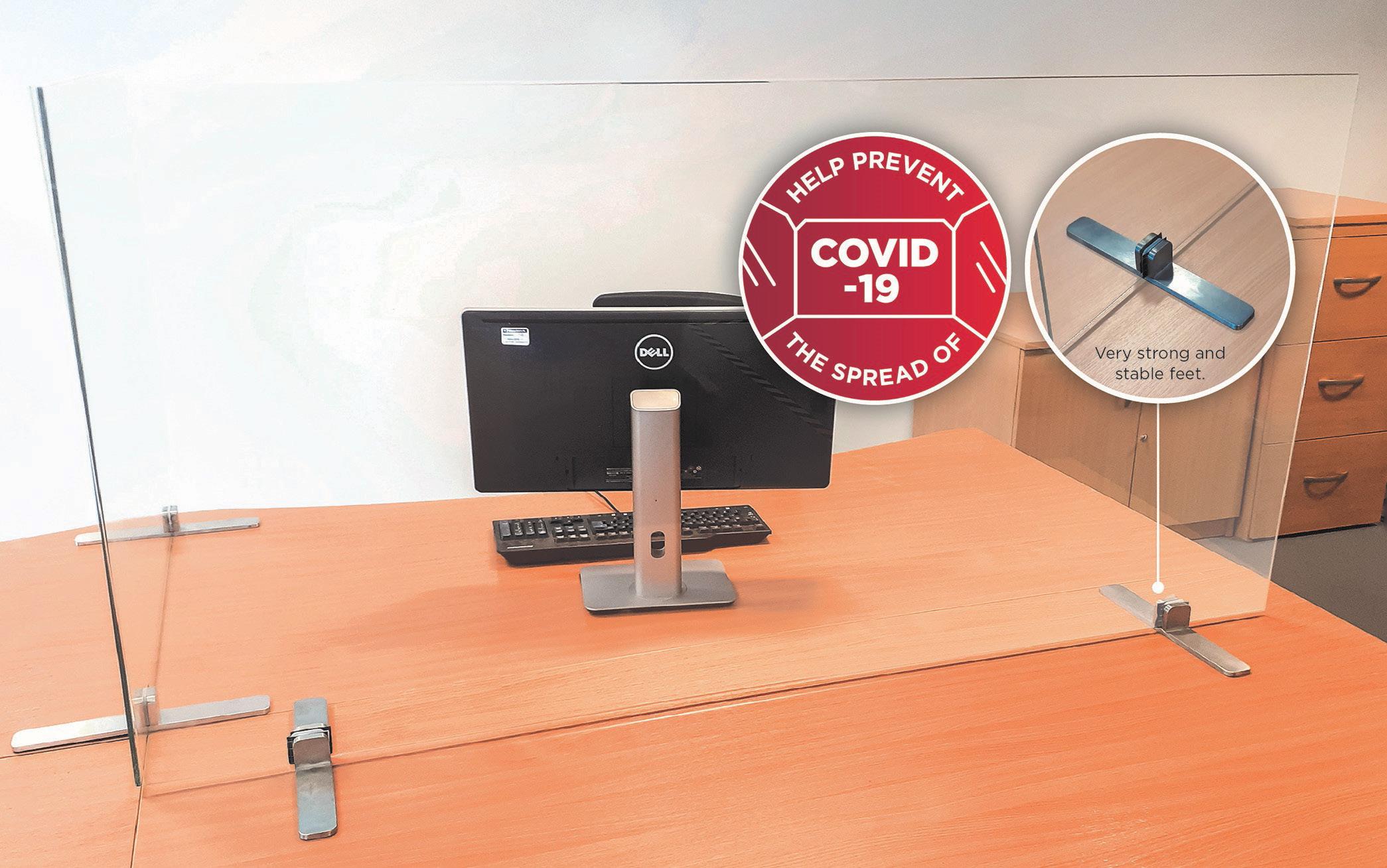
14 minute read
Free-standing COVID-19 Easy Sneeze Guard office desk solution from Glassolutions
Health & Safety
Free-standing COVID-19 Easy Sneeze Guard office desk solution from Glassolutions
UK manufacturer Glassolutions has launched a free-standing COVID-19 desk-top glass sneeze guard, ideal for social distancing in offices.
The Easy Sneeze Guard is made from strong, hygienic and easy to clean laminated glass. It has been developed as a solution to screen adjacent desks in open-plan offices, to help prevent the spread of germs and infection, and protect staff as they return to work.
The easy-to-fit sneeze guards are available in three standard sizes: 1000mm, 1100mm and 1500mm wide, with a height of 800mm, and come with two clamps for safe and sturdy positioning on office and reception desks. There is no requirement to screw into the desk so preventing permanent damage. Prices start from £127.77 plus VAT and delivery.
Lisa Dunn from Glassolutions, which is part of the international Saint-Gobain Group said: “As the Government starts to relax the lockdown rules, businesses are planning how they can safely return to work. According to the World Health Organisation, Coronavirus mainly spreads through the air when an infected person coughs or sneezes. A sneeze guard serves as a simple yet highly effective physical barrier between staff or customers reducing exposure to potential infection.
“Glass sneeze guards are particularly effective and practical
as they are easy to clean and disinfect, scratch resistant, and durable – and look far more stylish than plastic alternatives in today’s modern office spaces.
To view an assembly video and for more information about the Easy Sneeze Guard from Glassolutions visit https:// glassolutions.co.uk/en-gb/ glass-sneeze-guards, email salessupport.glassolutions@ saint-gobain.com or call the customer services team on 0333 321 6555.
Health & Safety
‘If it sounds too good to be true, it is” – advice from the CHSA on false claims
As the lockdown in the UK begins to lift, organisations need to clean and keep clean offices, shops, and all other public spaces. The advice from the Cleaning & Hygiene Suppliers Association (CHSA) is to be cautious of extraordinary claims for products – “if it sounds too good to be true, it probably is”.
Demand for certain cleaning and hygiene products – hand and hard surface sanitisers, gloves, disposable polythene aprons, non-woven wipes – continues to far outstrip supply. Unscrupulous profiteers are capitalising on the opportunity, some making extraordinary, false claims for products.
Lorcan Mekitarian, Chair of the CHSA said: “We have seen some remarkable claims for products. They have included statements that cleaning once with a hard surface sanitiser will keep a surface sterile for days. It sounds exactly what businesses need, but it’s only true in laboratory conditions. In a real-life environment, as soon as someone or something touches the surface there’ll be a residue on which the coronavirus can survive.
“As we’re previously reported, there is also a marked increase in imported Personal Protective Equipment (PPE) with fake or no CE marking. The CE certification mark indicates conformance with European Union directives regarding health and safety or environmental protection.
“Turning to products with extraordinary claims is tempting, particularly when your regular suppliers may be rationing product due to shortages. Buying product from new, unknown suppliers claiming to have good stocks of ‘compliant product’ may sound good but it’s a waste of money if they don’t have the right certification mark.
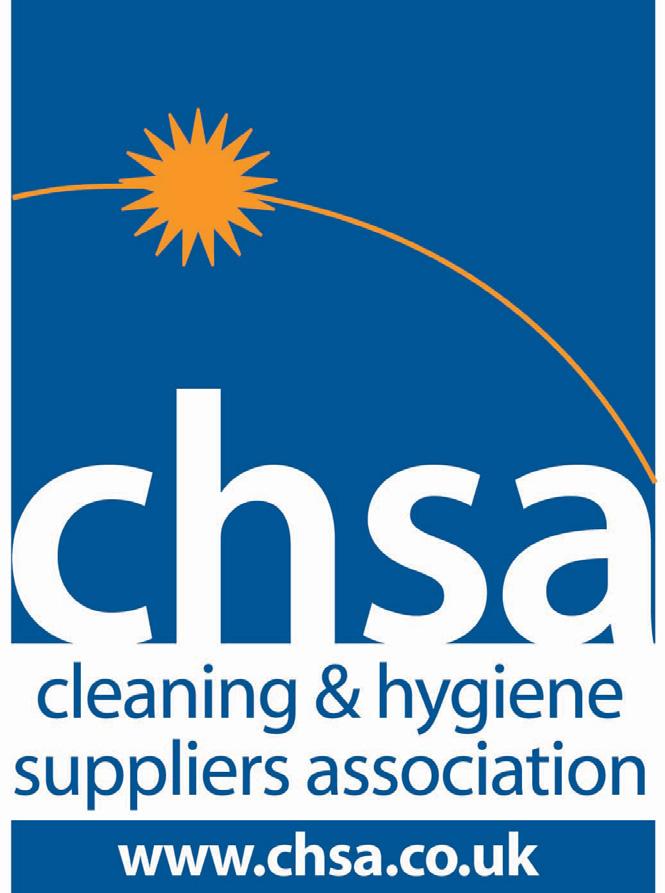
The CHSA is advising buyers of cleaning and hygiene products to:
Be sceptical about product clams. It if sounds too good to be true, it probably is. Ask for evidence to back up the claims, obtain CE declaration and or any test reports to show conformance to specification
Buy from a reputable supplier. Members of the CHSA have all signed the Association’s rigorous Code of Practice, which requires members to be “’well established’ in the cleaning and hygiene industry and to maintain a high standard in the conduct of its business.” Look for the CHSA logo and CHSA Accreditation Scheme stamp.
The CHSA Accreditation Scheme stamp guarantees members of the Schemes for Distributors and Manufacturers of Soft Tissue, Plastic Refuse Sacks and Industrial Cotton Mops make sure ‘what’s in the box is what’s on the box.’
Compliance to the CHSA’s Accreditation Schemes and Code of Practice is guaranteed by a rigorous auditing process conducted by an independent inspector.
@CHSACleaning www.CHSA.co.uk

Health & Safety GX Glass launches flexible hygiene screen system
Premium glass producer Gx Glass is helping workplaces safeguard against coronavirus with its new range of safety glass hygiene screens and sneeze guards, suitable for a wide variety of office, retail, education and hospitality environments.
Toughened to BS EN 12150, Gx Glass’ range of float glass screen products will not scratch or discolour over time, providing a more durable and long-lasting investment when compared with plastic or acrylic alternatives. The glass can also be covered in a specialist coating which offers effective protection against staining and discolouration as well as the adhesion and growth of micro-organisms.
The innovative systems allow for multiple configurations with both freestanding and mechanically fixed options available in a variety of sizes for both desk and floor level. A wheeled option is also available. The screens are fully customisable and bespoke cut outs can be added for till points where necessary. Finally the range is easy to self-install, however survey and installation services are also available.
Joanna Lush, Business Development Manager at Gx Glass, commented, “Glass is an ideal material to use in the fight against infection as it is non-porous, meaning it will not absorb particles and is easily disinfected. This contrasts with plastic or acrylic screens, which over time can scratch and degrade, becoming more porous and susceptible to the transmission of germs.
“Our range of hygiene screen and sneeze guards are flexible and adaptable to a given environment with a variety of fixings available. We can also provide further options beyond

just hygiene purposes, such as company branding, coloured panels, and even magnetic notice board options.”
For more information on Gx Glass and its range of products, please visit: www.gxglass.com.
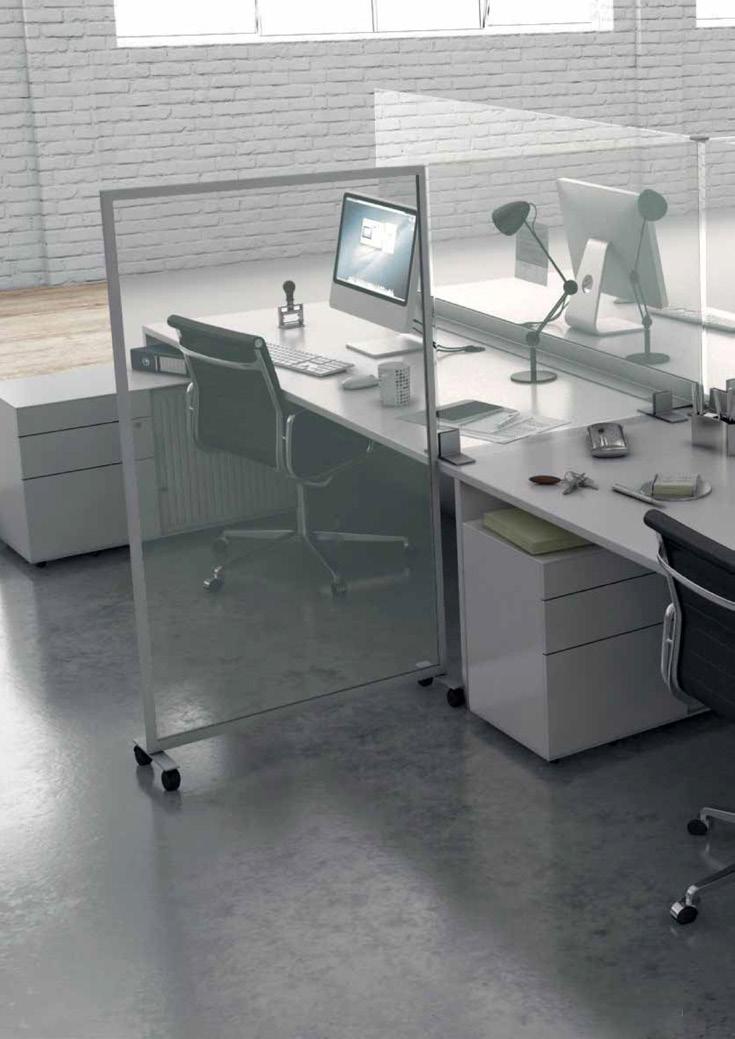
On The Cover Adapting your workspaces without the worry
As employees start to return to the workplace, they need to feel confident that their work environment will be safe. With hygiene a higher priority than ever before, cleanability of surface materials is coming under close scrutiny in workplaces across all sectors. Dave Ford, Specifications Manager with Altro, considers the pitfalls of some common materials and how simple, smart swaps can meet safety, aesthetic and comfort criteria.
In these rapidly changing times, employers are looking for guidance as they seek to ensure a safe environment for staff, customers and visitors. The British Council for Offices is one of the first to issue recommendations, saying “Materials and finishes should be selected to be easily cleaned; they should be hard, smooth and resistant to appropriate cleaning chemicals. Surfaces should be free from irregular features (nooks and crannies) that may harbour contamination.”
You may have carpet or carpet tiles installed, paint on the walls and tiles on the walls or floors - all of which can fall short against the British Council recommendations.
Carpet vs vinyl floors
Looking first at carpet, the issues here centre around cleanability. Carpet tiles or carpets are designed to be vacuumed and not cleaned daily with the detergent required to clean viruses - you cannot vacuum up bacteria and viruses. Having vacuumed, you would need to wet clean the carpet or carpet tiles with detergent daily at 56ºC in order to kill any virus.
This daily process is required because the virus remains active for 24 hours on this surface. Cleaning therefore becomes more costly in terms of time and money, while requiring a long time, possibly several hours, to dry; this means your surface can remain damp for hours each day after cleaning, providing the potential for yet more ideal conditions for the growth of microorganisms, including bacteria and viruses.
Detergents can easily stain carpet, whilst overwetting carpet tiles can cause them to curl, be prone to fast resoiling, the growth of mildew and the occurrence of odours.
Steam cleaning is another option, but carpet tiles can take 12 to 24 hours to dry fully when steam cleaned and shouldn’t be walked on during that time.
Modern vinyl floors offer an ideal alternative to carpet and carpet tiles. There are many options now available with similar sound reduction properties to carpet tiles – 17 to 18dB, so there’s no need to compromise on in-room sound and transmission of noise. There is also the option to use an impact sound reduction underlay.
Comfort underfoot is also a key performance benefit of many vinyl floors, especially those which also offer sound reduction properties, so a switch from carpet to vinyl need not lead to a compromise on comfort.
And the biggest benefit of vinyl over carpet is on cleanability. High quality vinyl floors can be cleaned at up to 60ºC; viruses are killed at 56ºC (US National Library of Medicine). No different detergent
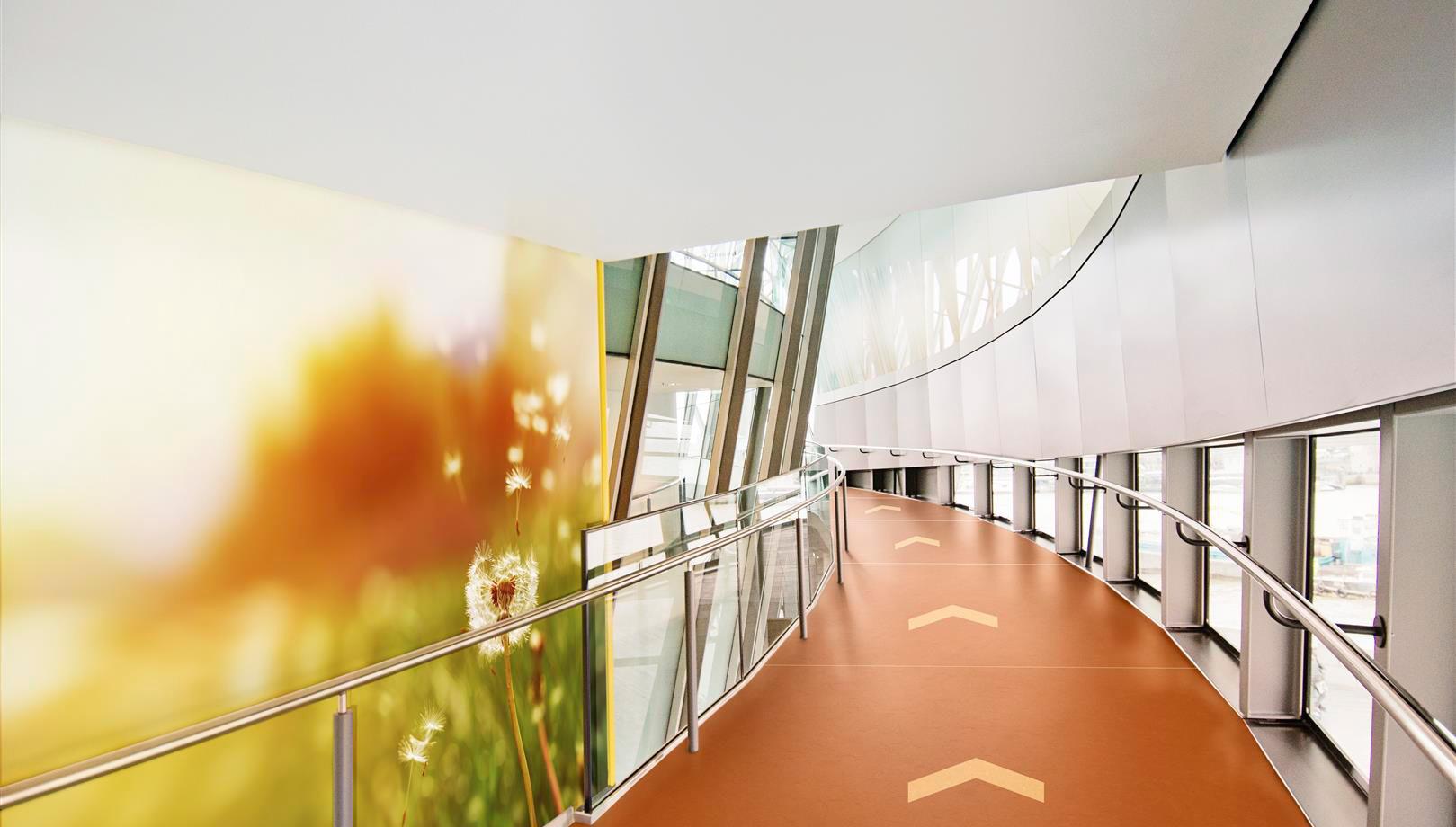
or process is needed when you already have the ability to spray, steam or power clean the flooring.
Dirt sits on the surface of vinyl flooring rather than penetrating the pile of carpet. So vinyl floors are cleaned faster, with products less likely to cause damage to the floor and also dry faster for a speedy return to service.
With budgets under scrutiny too, you need to have confidence that what you invest in will maintain its appearance and performance for years to come. Quality vinyl flooring is a proven, robust solution, not affected by indentation from office furniture movement or rolling loads, and with guarantees of up to 20 years.
Paint and tiles vs wall cladding
The World Health Organisation has proved that the Covid 19 virus will live for 72 hours on hard surfaces such as walls, therefore necessitating regular detergent cleaning. However, only certain surfaces are suitable for cleaning in this way. PVC wall cladding can be cleaned with detergent, up to 60ºC. Many other surfaces are not robust enough to cope with such cleaning. For example, paint is only microns thick and is easily damaged. Plasterboard under paint tends to be weak and absorbent and easily dented or damaged, particularly below waist height where walls can be prone to knocks and scrapes. Damaged surfaces can harbour microorganisms more readily than undamaged, smooth surfaces.
Emulsion paint is not designed to be wet cleaned and can come away when cleaned with water – a process which is exacerbated when cleaned with the detergents required to keep the area hygienic. This results in patchiness, reducing the overall aesthetic appeal and requiring extra maintenance.
Tiles are another popular wall or floor finish, and although easier to clean than paint they too create hygiene headaches. Grout is often the weak spot for hygiene – it often becomes porous with age which means it will harbour microorganisms, providing breeding grounds for bacteria and viruses. Grout is difficult to clean and can shrink and cause gaps between the tiles, again providing the perfect environment for microorganisms to multiply.
Cracked or shattered tiles also lead to ideal breeding grounds for bacteria and viruses, and as individual damaged tiles can be difficult to remove, the problem perpetuates.
Wall cladding systems remove many of these risks. Altro’s systems are 2.5mm thick, with colour throughout the thickness of the product. They are durable and robust, with life expectancy of up to 25 years and come in a wide range of colours and bespoke options.
Altro Whiterock hygienic wall cladding has a smooth, non-porous surface and comes in sheets to provide coverage from floor to ceiling with no grout required. It is easy to clean, with detergent, up to 60ºC. As a fully bonded and watertight system, there is nowhere for microorganisms or bacteria to hide.
Altro Fortis wall protection protects the wall and substrate from bumps and scrapes, again giving nowhere for microorganisms to hide and breed. For a total hygienic system, install vinyl flooring combined with wall cladding and doors.
We want to play our part in helping the country get through this difficult time. We have extensive experience working across all sectors providing specification and technical support, whatever the challenge. Please get in touch if you have any questions.
Because it’s vital to clean floors, walls and doors effectively, we’ve produced a range of cleaning guides to help you get it right first time. Visit our website to find out more:
www.altro.com
Key questions to ask - are your surfaces up to the task? • Are floors, walls and doors easy to clean? • Does dirt sit on the surface or penetrate into the pile of a carpet, the grout or cracks on tiles or the substrate on a damaged painted wall? • Are surfaces cleanable at more than 56ºC? • Do surfaces have a high chemical resistance to allow for regular disinfection? • Are surfaces impervious, hard and nonporous so microorganisms have no place to hide?
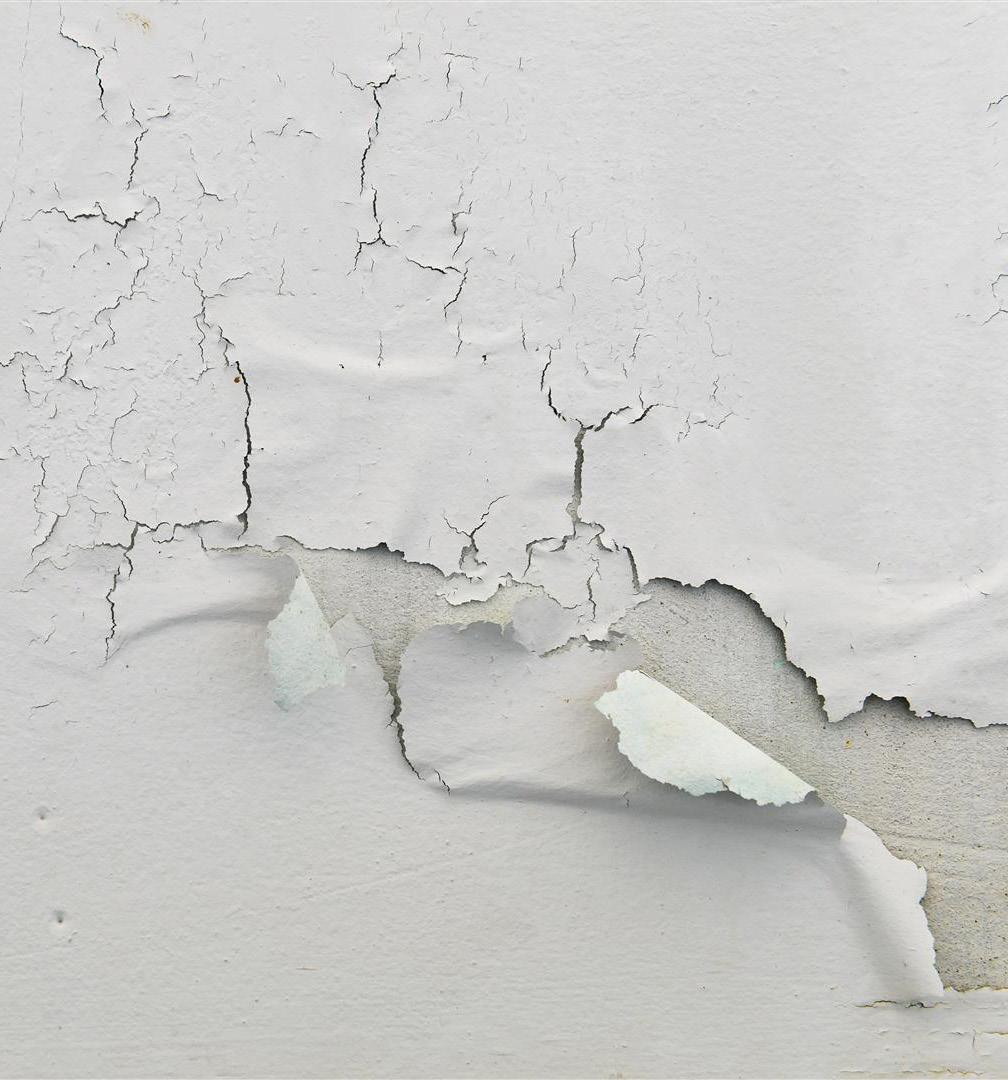

Health & Safety Smartway2 launches a social distancing and contact tracing solution to enable a safe return to work amidst COVID-19
By automating resource booking procedures, Smartway2 ensures that people can only access desks, rooms, equipment and other facilities that are sanitised and at a safe distance apart, solving the logistical challenge of protecting people in the workplace.
Smartway2, a next-generation technology company specialising in workplace scheduling solutions, today announced the release of its COVID-Safe Workplace functionality that enables organisations to implement social distancing, contact tracing and improved sanitation procedures, to enable a safe return to work.
Smartway2 takes an innovative data-driven approach to optimising workspace utilisation, which in turn drives productivity and collaboration. The platform’s uniquely flexible ‘rules engine’ allows it to be rapidly configured to almost any workflow.
As the pandemic unfolds and organisations face an unprecedented pace of change, the ability for technology to adapt to newly emerging needs on the fly is becoming increasingly vital.
Smartway2 protects people in the workplace by automating social distancing, contact tracing and sanitation checks. When someone books a desk in Smartway2, all surrounding desks within a specified radius are automatically taken out of service. When the desk is vacated, a countdown timer in the system will prevent anyone else booking it until it has been sanitised, to prevent touch contamination; and sign-off and release procedures for desks and rooms are fully automated.
To stop people sitting in a desk that is not safe, Smartway2’s digital desk displays indicate whether the workstation is available, awaiting cleaning or out of service.
In the event that someone falls ill, Smartway2 can produce contact tracing reports that identify at-risk colleagues, categorising their risk level depending on their likely proximity to that person.
“We’re incredibly fortunate to be in such a strong position to help organisations who are struggling to come to terms with the scope of change that’s necessary to keep their people safe,” said Smartway2’s CEO, John T. Anderson. “One of the key
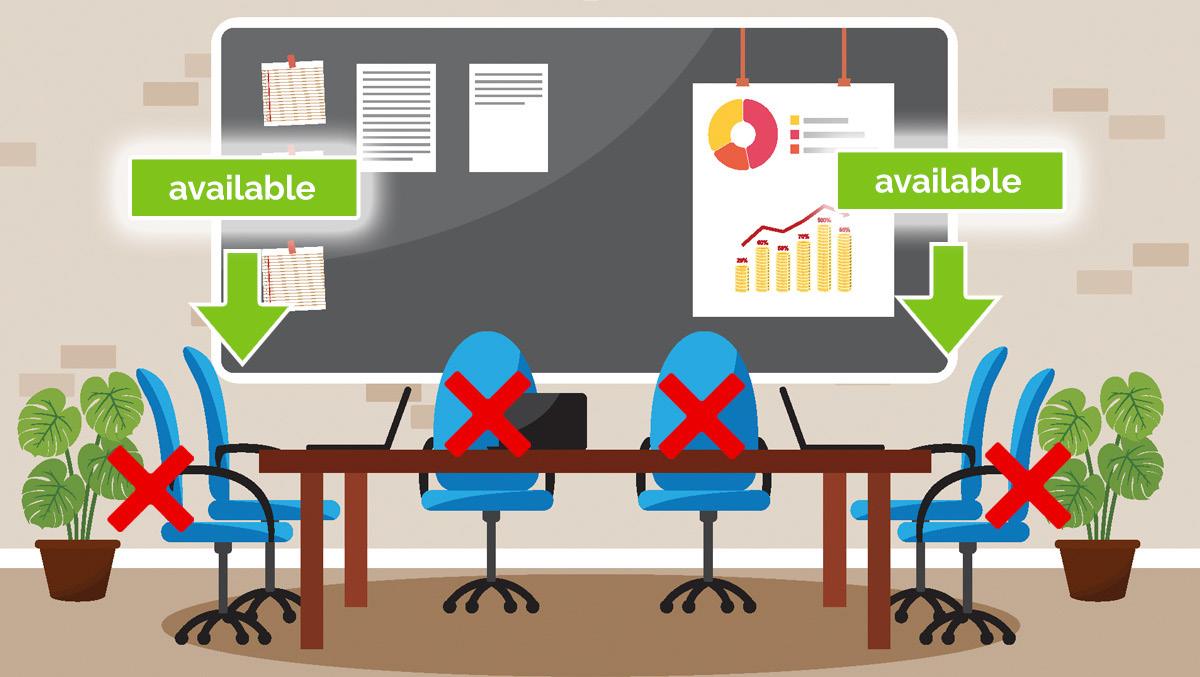
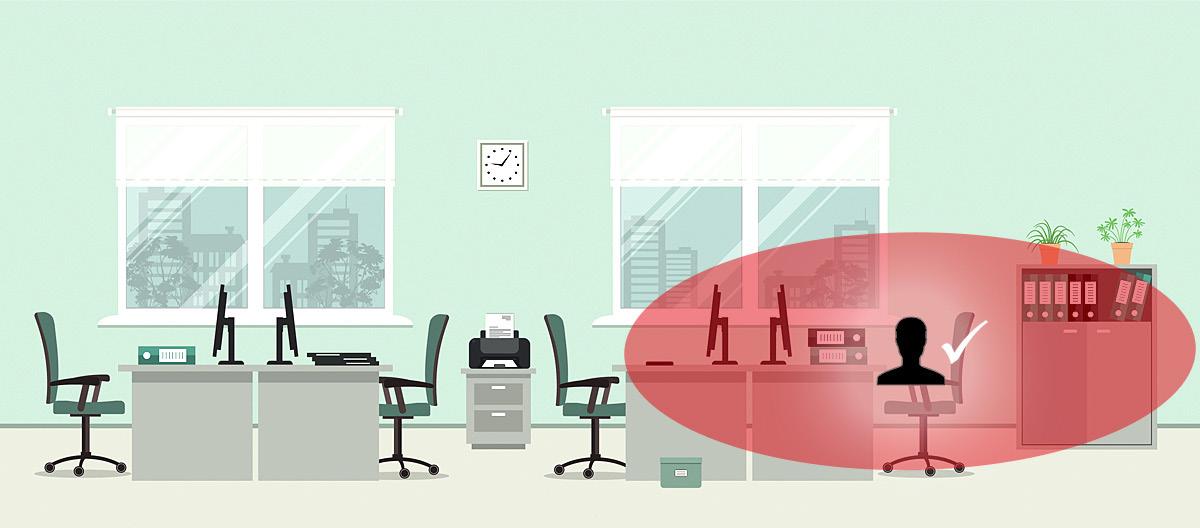
design principles we obsessed over when coding the product was flexibility. We wanted to be the first – and for some time to come, perhaps – the only solution that can easily be configured to cope with an immense variety of scenarios. As a result we built a flexible rules engine. At the time we had no idea that it would be so well suited to helping organisations safety return to work amidst a global pandemic. That is a scenario I fully admit we did not plan for, but we are grateful for the opportunity to make a difference during these challenging times.”
Founded in 2014, Smartway2 has expanded aggressively opening corporate headquarters in the U.S. and growing its footprint in APAC and Europe, as well as increasing its reseller base worldwide.
Since 2018, Smartway2’s headcount has tripled, with new leadership and key hires that bring extensive industry experience to marketing, sales and engineering.
“It’s so flexible and customisable that we can make it do whatever we want it to do,” said Smartway2 customer Joel Olson, Programmer & Analyst at Amarillo ISD. “With other tools on the market, there’s no way to achieve that. Smartway2 won’t just serve our current needs – it’s flexible enough to adjust to whatever we decide we need in future. It’s built in such a way that we can innovate.”
Smartway2 is a robust, cloud

based, enterprise solution that not only provides COVID-Safe Workplace functionality, but also uses advanced workspace analytics and data visualisation to help companies understand precisely how meeting rooms, desks and other resources are being utilised. These capabilities have become increasingly important to organisations impacted by Coronavirus, as remote working becomes the new normal and the role of the workplace undergoes a fundamental shift. Smartway2’s ability to help organisations reduce real estate costs while improving employee experience, collaboration and productivity will benefit organisations far beyond these challenging times.






